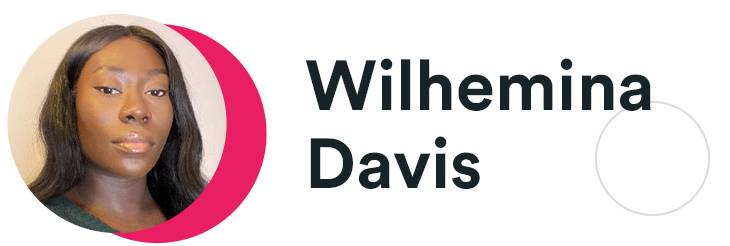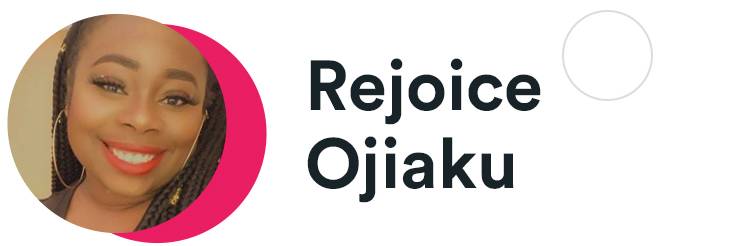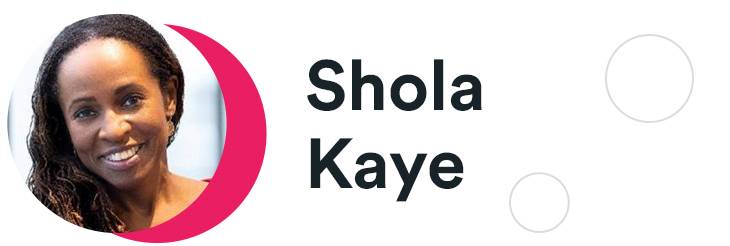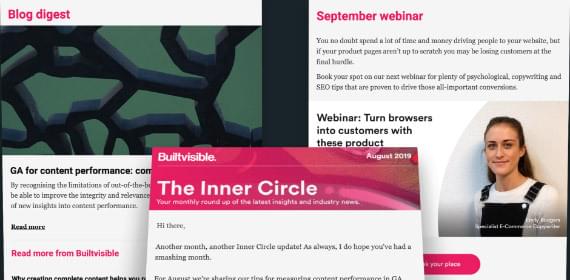What was your route into your field?
Wilhemina: I didn’t have any knowledge of marketing until my second year of university. After some research, I decided it was the industry I wanted to work in once I graduated. After university, I went on to do an internship in my final year and participated in a marketing summer school, which was an amazing experience.
Rejoice: I took the traditional route, which was GCSEs, A-Levels, university, masters and then a graduate role in SEO. My first job was pivotal because it was a good way for me to enter the industry and learn a lot within my first year.
Shola: After university, I was unsure of what I wanted to do which led to experiences in teaching, travelling and postgraduate education. Once I landed on my feet in corporate roles, I frequently struggled with my confidence, which led me on a path to self-development, performing and public speaking.
What does being a black person in marketing mean to you?
Wilhemina: It means doing whatever I can to ensure there are more people like me in the office. It means amplifying voices and networking with the people already in the industry. It means being my unapologetic self and applying a combination of my life experiences and skills to my role every day.
Rejoice: Being black in marketing to me means that I can, to an extent, help shape the perception about black people and ensure representation is accurate. The presence of different people in marketing is just as important as the representation in the media. To encourage other young black people that they can attain amazing positions, role models are important.
Why is diversity important and what is the cost of overlooking it?
Shola: Recognising diverse groups and what they have to offer is the right thing to do. Without doing so, it’s easy for people to feel side-lined or less than when everyone deserves to be respected and catered to. Overlooking it in the workplace can lead to employee disengagement whereas we could be thriving on the creativity and additional perspectives gained.
Have you faced any barriers within the industry or felt you couldn’t do something because of your race or identity?
Rejoice: One major barrier for me is racial anxiety when starting a new job due to the fear of being perceived negatively. This has led to me lessening my true self to create a version I believed would be more acceptable.
Shola: Early on in my career, I felt like my lack of confidence and being an introvert worked against me and wasn’t understood. In hindsight, training would have better equipped me with the tools I needed to succeed, however, I found myself faced with disciplinary actions, because my employers didn’t understand that introverts aren’t comfortable with speaking out spontaneously. I overcame this setback by immersing myself in training to become a life coach and professional singer in which I got used to people looking to me. I also did a lot of personal development work. A big part of what I do now is to help people overcome the blocks that I faced so they can flourish.
What advice would you give to anyone attempting to break glass ceilings?
Wilhemina: I would advise them to be themselves, not to try and fit a mould but to create their own. Don’t be afraid to ask for help and don’t minimise yourself in a bid to make others feel more comfortable.
Rejoice: Be unapologetically you. Breaking the glass ceiling should happen because companies understand your true authentic self and recognise it is needed within the industry. Also understanding why you want to break the glass ceiling is a great way to keep your passion alive.
Shola: A mentor or coach is a great step in the right direction. If you don’t have access to these, role models to look up to are also very inspiring.
What advice would you give to organisations who want to increase their diversity?
Wilhemina: Challenging racial bias in professional places is important. I would ask companies to start looking into putting policies in place to protect minority groups, and how diversity and inclusion show up throughout the organisational structure and especially in leadership. These are big ways that display a change in the industry.
Rejoice: Involve the voices of black people in the conversation and remembering everyone is responsible for making change happen. It would be impossible to leave this all to one person to implement, however, the change should start from those in senior and leadership roles.
Shola: Authenticity is key here and it must be done the right way. Survey and talk to your employees, make diversity a part of everything, apply it to hiring and recruitment. Also, reward people for their actions towards diversity and inclusion in the workplace as it is fundamental to the progress of a company.
Tips for creating long-lasting diverse workplaces
- Effective change starts by looking at your current position. Identifying where you are now will highlight areas that are evoking change and others that possibly need more work. Delving into your current workforce, recruitment process, development and staff retention is a great place to start.
- What does your current recruitment process look like? Do you question the processes of external recruiters? If you aren’t attracting a diversity of applicants’, chances are revaluation and taking actions off the back of this could lead to a larger and more varied pool of candidates. Involve a range of employees within the recruitment process, from the initial phase where they can offer a different perspective on where else to seek candidates, to building the hiring stages, and being present at interviews. As highlighted in my chat with Rejoice, Wilhemina and Shola, an apparent diverse workforce is essential in moving forward.
- Company culture should be just that, a culture inclusive of all individuals within a company. One of the great things I’ve found about the marketing industry is the social aspect. When outlining what yours looks like, it can be rewarding to again involve a variety of people. Sending out a survey or asking for suggestions from different people may also lead to some great and varied company culture ideas. This can also be a way to get feedback from introverts or those who appear disengaged.
- Setting a standard and educating yourself and employees on diversity and inclusion (in the form of training, seminars and other resources) is headed in the direction of permanent and positive change. But with learning also comes unlearning, as there is an element of unlearning we all need to be proactive about. You can also look at it from another way and pass on your knowledge to those who are weighing up their career options. Offering work experience, internships and mentorships is a great way to expose a career in marketing to a wide audience, having a positive impact on the industry for years to come.
- Even outside of diversity and inclusion matters, mental health and wellbeing should be at the core of company values. Conditions like anxiety, depression and imposters syndrome are on the rise with 1 in 6 people reporting experiencing a common mental health problem (such as anxiety or depression). The numbers are even higher for minority groups. Management training on mental health and promoting a healthy work culture will help create a happy, open and supported space while getting the best out of your workforce.
Thank you to our contributors:

Wilhemina is an SEO Account Executive at Neo Media World and Co-Founder of B-DigitalUK. Wilhemina hopes to advance her career in SEO and eventually become Head of SEO in which she can help other young Black students step into the industry unapologetically themselves.

Rejoice is currently a Global SEO Account Manager at Neo Media World, she co-founded B-DigitalUK because she is passionate about Black representation within Advertising and ensuring companies are truly diverse and inclusive.
B-DigitalUK is a platform created for Black People to educate and inspire about Digital Marketing/Advertising. It also looks to help those transitioning into the industry by showcasing Black representation within the industry to highlight what is possible. Linktree: linktr.ee/BDigitalUK

Shola Kaye is a communication consultant, author of two books and an award-winning speaker. Her keynote and masterclass topics include communication for diversity and inclusion, workplace communication, in particular for teams that deal with complex information, and workplace empathy. She also speaks about how to create a more inclusive environment for introverts, especially within the technical/data/STEM workspace. Find out more: sholakaye.com/speaking
